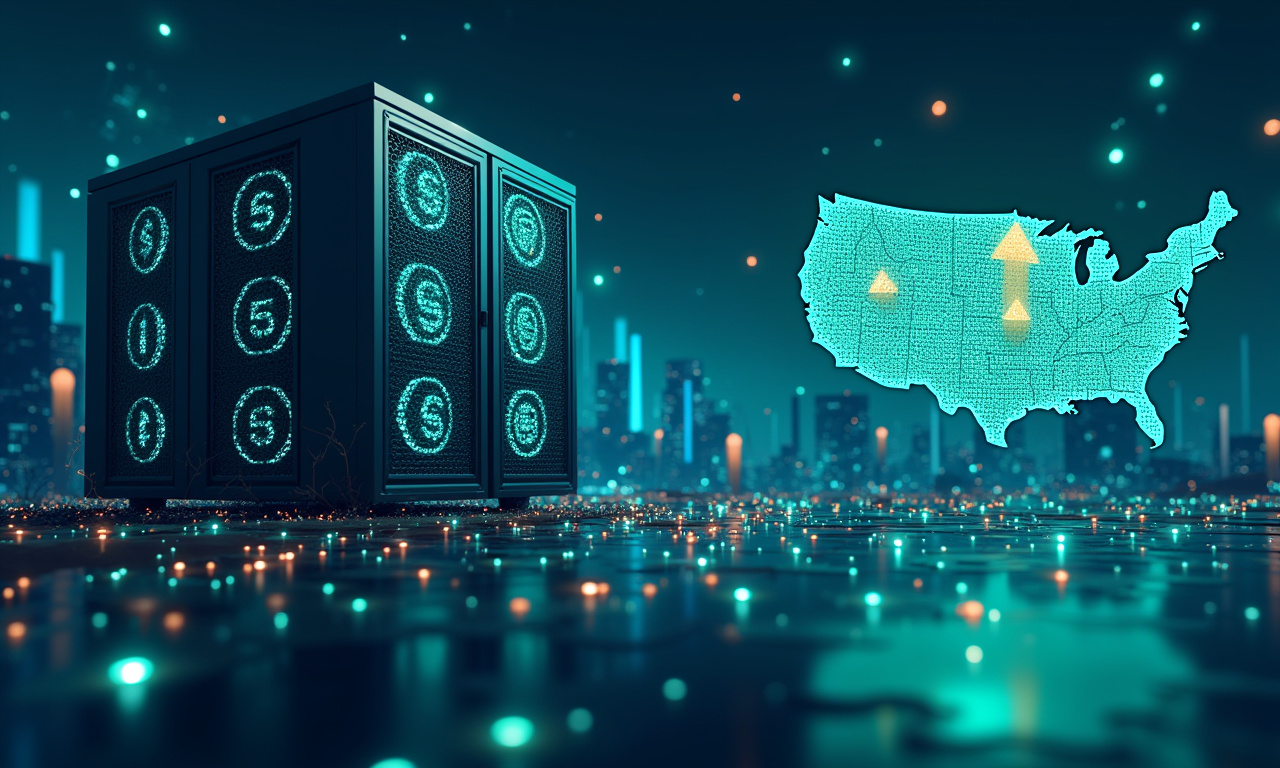
Granbury, Texas, is currently going through a sad, disruptive challenge. This conundrum illustrates the increasing chasm between technology for technology’s sake and the health of the community. Residents are grappling with relentless noise pollution emanating from a nearby Bitcoin mine, turning their once-peaceful environment into a constant source of stress and discomfort. This extraordinary moment represents a real 21st century David and Goliath story. Through all of this, everyday people have been courageously standing against the mighty crypto industry to defend their communities’ quality of life.
What’s happening over in Granbury goes well beyond a few ruffled feathers. These reports indicate that noise levels have increased to 70-90 decibels. Regular discussion usually clocks in at about 60 dB. Over time, sounds louder than 85 decibels can lead to irreversible hearing loss. Karen Pearson, a neighbor directly impacted by the mine’s operations, recorded a shocking 82 decibels at her property line. This unmitigated, incessant wave of noise shatters sleep and cuts into property values. It destroys the quality of life for those unlucky enough to live close to the Bitcoin mine.
The crux of the issue can be found in the demonetization of currency bitcoin exemplifies. These facilities require massive sources of energy. At the heart of any blockchain lies a network of thousands of specialized computers that work around the clock to solve complex mathematical problems and secure the blockchain’s transactions. While the cooling systems are critical to preventing these highly sophisticated computers from melting down, they produce an immense amount of noise. This noise is now pouring over into the greater community. This all raises profound questions about the moral obligations of the cryptocurrency mining firms. It underscores the dire need for strong, commonsensical regulations that put the welfare of area residents first.
Understanding the Regulatory Landscape
Working through the thicket of noise pollution regulations can feel overwhelming. Knowing the landscape that’s out there is key for residents who are seeking to address this issue. That federal oversight has waned over the years. Federal law has long been a barrier for state and local governments that wish to regulate aircraft noise or enforce noise ordinances.
Federal Regulations
- The Noise Control Act of 1972: This federal law was designed to regulate noise pollution and establish noise level standards. Although the Environmental Protection Agency's (EPA) Office of Noise Abatement and Control was shut down in 1982, the Act still provides a framework for addressing noise pollution concerns.
- EPA's Clean Air Act: While primarily focused on air pollution, the Clean Air Act also addresses noise pollution. Residents can file complaints with the EPA if they believe industrial operations are violating noise standards.
- Quiet Communities Act of 2021: Although not specifically focused on industrial noise pollution, this proposed legislation aims to address noise pollution in communities. Residents can support similar legislation or advocate for its expansion to cover industrial noise pollution.
State and Local Regulations
- State and Local Government Regulations: Since 1982, decisions regarding noise pollution have been transitioned to state and local governments. Residents can check with their local authorities to see if there are any noise ordinances or regulations that can help mitigate noise pollution from industrial operations.
- Local Noise Ordinances: Many cities and towns have local noise ordinances that regulate noise levels. Residents can contact their local government to report noise complaints and seek enforcement of these ordinances.
Taking Action
Residents in Granbury are not without recourse. And they can and should take a number of practical steps to minimize immaterial harm—most notably, industrial noise. Moreover, they can promote a calmer, less stressful public space. These tactics range from legal avenues to community organizing efforts, to diligent documentation of the noise’s impact.
- Documenting Noise Levels: It is essential to keep a detailed record of noise levels, including dates, times, and decibel readings. This information can be invaluable when filing complaints with local authorities or pursuing legal action.
- Contacting Local Authorities: Residents should report noise violations to their local government, including the city council or county commissioners. Persistence is key, as it may take multiple complaints to prompt action.
- Seeking Legal Counsel: Consulting with an attorney who specializes in environmental law or noise pollution can provide valuable insights into legal options, such as filing a lawsuit against the Bitcoin mine.
- Community Organizing: Forming a community group or joining an existing organization can amplify the residents' voices and increase their collective bargaining power.
Community-Based Strategies for Noise Reduction
Beyond these individual actions, community-based strategies can be even more effective at raising awareness about noise pollution and spearheading efforts to push for change. Through collaboration, local residents can make their voices heard, building a more powerful grassroots coalition to sway decision-makers.
Building a Collective Voice
- Establishing community organizations: The Right to Quiet Society, a Canadian organization based in Vancouver, and Quiet Communities, a US-based organization, are examples of community organizations that have been effective in promoting quieter environments.
- Building coalitions: Collaborations between community groups, local governments, and health organizations have been successful in addressing noise pollution, such as the partnership between the Federal Aviation Administration and Los Angeles World Airports to mitigate air traffic-driven noise pollution in Inglewood, California.
- Community engagement and education: Raising awareness about the impacts of noise pollution on health and quality of life has been an effective strategy, as seen in the work of Dr. Arline L. Bronzaft, who has assisted many New Yorkers with their noise problems and promoted noise reduction efforts.
- Advocacy and policy change: Advocating for policy changes, such as the creation of noise control acts and regulations, has been a successful strategy, as seen in the passage of the Noise Control Act of 1972 and the Quiet Communities Act of 1978 in the US.
- Use of technology: The development of noise-monitoring apps, such as the ICBOs noise app, has been identified as a useful tool for creating awareness and promoting community engagement in noise reduction efforts.
Ethical Considerations and Broader Implications
The situation in Granbury raises profound ethical questions about the prioritization of economic gains over the well-being of local communities. Cryptocurrency mining can provide meaningful economic development opportunities. Yet we need to acknowledge its environmental footprint, resource use and social cost.
Weighing the Costs and Benefits
- Environmental Costs: Cryptocurrency mining consumes a significant amount of energy, leading to concerns about its environmental impact, especially if the electricity used comes from non-renewable sources, resulting in substantial greenhouse gas emissions.
- Water Usage: Bitcoin mining also consumes vast quantities of fresh water, rivalling the total water usage of nations like Switzerland.
- Negative Impact on Local Residents: Prioritizing cryptocurrency mining over local residents' quality of life can lead to issues such as increased energy costs, noise pollution, and strain on local resources.
- Facilitating Illegal Transactions: Cryptocurrencies can be used for illicit activities, such as money laundering and ransomware attacks, which can have negative consequences for individuals and communities.
- Unequal Distribution of Benefits: The benefits of cryptocurrency mining may not be evenly distributed, with some individuals or groups profiting at the expense of others, potentially exacerbating existing social and economic inequalities.
Finding a Balance
A sustainable approach to cryptocurrency mining requires an intentional middle ground. We need to balance short term economic interests with long term community needs. Third, we will be more aggressive in regulating noise effects. Additionally, we will advance our renewable energy portfolio and continue to be honest and transparent with residents on any concerns they have. By prioritizing ethical considerations and community well-being, it is possible to foster a more harmonious relationship between technology and society.
The tragedy of Granbury, Texas is a warning for towns all over the world. As cryptocurrency mining continues to expand, it is imperative that we learn from these experiences and take proactive steps to protect the environment and the quality of life for all residents. Join us in advocating for a quieter, healthier, more equitable community! Through concerted political action and a steadfast commitment to our ethical core, we can and we must prevail in this fight.

Lee Chia Jian
Blockchain Analyst
Lim Wei Jian blends collectivist-progressive values and interventionist economics with a Malaysian Chinese perspective, delivering meticulous, balanced blockchain analysis rooted in both careful planning and adaptive thinking. Passionate about crypto education and regional inclusion, he presents investigative, data-driven insights in a diplomatic tone, always seeking collaborative solutions. He’s an avid chess player and enjoys solving mechanical puzzles.








